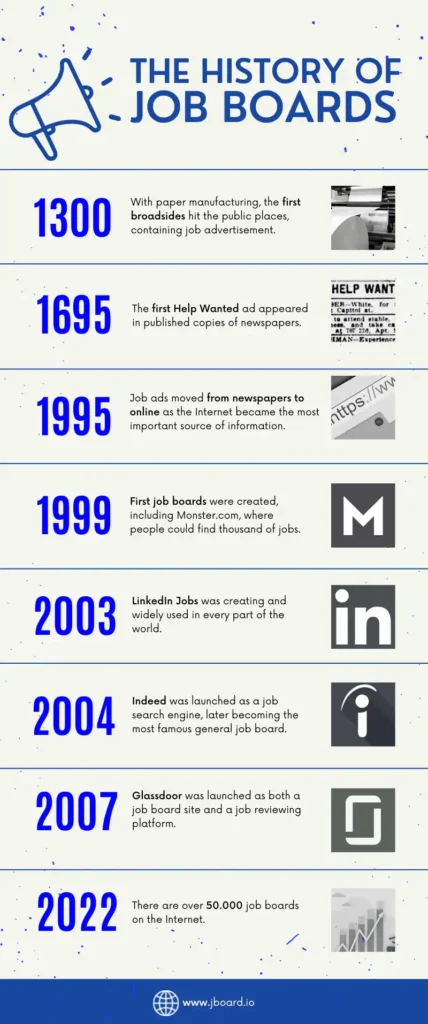Every entrepreneur looks to utilize human capital to give a thrust to the company’s growth. You will surely want to take your business forward, ensure comprehensive growth for it, accelerate your bottom lines, and optimize your profits. But how’s that possible without the right people working with you? Let’s explore the future of job boards in detail.

Image source: https://jboard.io/blog/what-is-a-job-board
It’s here that recruitment, hiring, and job search play a pivotal role. You need to have the top talent aligned to your organization and that too at the right time. While recruiters are always in search of suitable talent, highly skilled candidates are looking for great opportunities. What they need is a common platform to help them strike meaningful conversations.
The Emergence of Job Boards
As the biggest recruitment platforms in the digital world, job boards act as common meeting places for potential candidates and ingenious recruiters. Since both parties have profiles on job board websites, it becomes easier for them to look for one another.
However, the entire scenario has undergone huge transformations. Job boards weren’t as they are now. Rapid digitization and the emergence of new technologies led to crucial changes. Current job board sites differ from the traditional ones to a great extent.
Right from their inception to the present times, job boards have come a long way. Let’s take a look at this metamorphosis. Here’s to the future of job boards.
Back to History
Job boards have a historical background. What you see today is the result of evolution. Before we track these changes, it’s imperative to look into the past. The first official launch of job board sites took place in 1992 when Bill Warren introduced the ‘Online Career Center.’ Initially, it was a BBS or a Bulletin Board, which eventually merged with Monster in 1995.
In its initial years, job boards had a generalist approach. Recruiters could find employees from across the world and vice versa. While newspapers had a limited reach and geographical constraints, job board websites could reach out to innumerable people in one go. The promotional model was simple, and here’s a short glimpse of it:
- Presence of relevant ads
- Coverage for numerous job listings and vacancies across industry verticals
- No geographical constraints
- Imitating the classified ad model on the web
- Affordable and cost-effective
These characteristics and special features made job board sites quite popular in the recruitment world. It seemed like both employers and employees have got a way out.
Future of Job Boards – Tracking the Changes
With the generalist approach marking the beginning of this online job search revolution, new ways and ideas followed suit. During the early 00s or late 90s, the entire service arena came across four special types of websites.
1. Niche boards: This was a more personalized approach to job search and recruitment. Niche boards contain information about specific job roles, titles, job descriptions, and opportunities within a particular geographical region.
2. Network sites: Network sites had multiple listings. Say, for instance, recruiters and employers could hire for multiple vacancies, different job roles, and posts from the same vendor. Applicant tracking systems were gradually integrated into these platforms, enhancing the efficiency of the hiring process.
3. Job aggregators: You must have heard about Indeed, right? It is the perfect example of a job aggregator site. Sites like Indeed collect and collate information from multiple listings, where potential candidates can land their dream jobs through a single search.
4. Social networking: Social Job sites like LinkedIn completely changed the way recruitment took place. Candidates have the opportunity to showcase their skills in an open database, and recruiters can easily take their picks. Applicant tracking systems are now integrated into social networking platforms to manage job postings, track applicants, and streamline the hiring process seamlessly.
Right from the beginning of the 90s to the present times, here’s how job board sites changed with time. However, the prime objective or goals didn’t change much. Uninhibited resume access and job postings were of paramount significance, and these two aspects continued to be important.
Disruptive performance
Things were fine until the recession hit the service sectors and human resource management. Low budgets led to limited hiring, which further created a void in the recruitment world. Some of the job board sites completely stepped out of the business arena, and those who managed to survive tried to revamp their existing models. The emergence of disruption caused a lot of havoc with most job board sites rethinking their strategies.
Social recruitment gained momentum, and numerous companies opted for social recruitment channels. Compared to conventional sites, these platforms offered direct opportunities to both employers and potential candidates. Sites like Indeed outperformed traditional job boards, thus revolutionizing recruitment to a great extent.
The Law of Evolution
Recession, disruptive forces, job aggregators, social recruitment, and mobile devices are some of the milestones in the evolution of job boards. What we need to know is how these forces have shaped the entire recruitment arena. While some job boards are still reluctant to embrace the change, most have joined the revolution. Here’s a quick glimpse into their revolutionary behavior.
1. Find the match: It’s a unique job search model where the site matches candidates’ profiles with the employer. Both parties meet with each other with effective mediation from the site.
2. Pay-for-applications: Employers no longer need to pay for the posting. Once they receive and choose qualified applications, they can pay for the service.
3. Socializing: Social media is an integral and inseparable part of recruitment. Job boards can share crucial info about employers via Facebook, Pinterest, and Twitter. LinkedIn happens to be another option in this context.
4. Hyper-niche: Some of the sites contain job listings for a specific niche in a particular sector. Job seekers can breeze through the myriad of options available on these sites.
5. Mobile apps: There’s no denying the effects of the mobile revolution. Job boards aren’t quite far from that, and recruitments are taking place via mobile apps. Now, that prepares the ground for voice-based job searches too.
6. Multitude of options: Tweets, emails, and specific news are some of the best resources for an effective job search. Employer branding, social campaign management, and proper job distribution are crucial options in this context.
While these represent the evolution of job sites, there’s more to the story. You need to stay ahead of the growth curve, which demands a scalable and user-friendly job board site. Although job site owners are trying their best, there’s room for improvement.
According to the reports published by iCIMS, traditional job sites are still ruling the recruitment arena. With a mere 5% contribution, popular platforms like LinkedIn are still lagging. That creates a huge void in the job search sector, which further creates the need for new strategies and mechanisms. Here’s to the future of job boards.
With data analytics emerging as a strong force across sectors, let’s find out how it can affect the job search arena and job board sites.
Benefits of Data Analytics
Targeted data analytics help you gain crucial insights into the recruitment processes. With the help of analytics, you can get access to historical data, which helps you develop crystal-clear ideas for potential employees. Here’s how data analytics can help you stay ahead of the competition.
Crafting potential lists: Recruiters can take a look at crucial data and craft a list of potential candidates. Data will help them assign the right job roles to the right people.
Better ROIs: In online job board sites, a listing takes some time to go live. Once it’s live, data analytics will help you fine-tune them and ensure better job distribution. Here’s to the future of job boards.
Refine postings: Analytics plays a major part in helping you refine postings. As an employer, you get the chance to hire efficient candidates. You gain access to comprehensive information on candidates, their efficiency, and their skills. That’s a huge benefit when it comes to refining job listings.
Perfect guidance: Creating a professional advertisement or job campaign isn’t an easy task, several aspects are involved in the process and employers need to develop crystal clear ideas for each of them. Proper guidance and professional assistance are of paramount significance in this context. With the help of performance metrics and analytics, employers will learn the art of creating attractive job listings.
Targeted results: How would you feel to receive improper job offers? Or what will be the reactions of an employer when he gets unqualified applications? The experience won’t be quite pleasant in both cases. Data analytics improves situations by helping you achieve targeted results. Both the parties will receive targeted applications and offers.
Data and More: Foreseeing the Future of Job Boards
These benefits clearly explain how data analytics plays a crucial role in taking job board sites to the top. While employees gain the opportunity to locate the right jobs, employers have the chance to choose a highly efficient workforce. Most importantly, job board websites prepare the ground for a targeted search. Whether it is potential candidates or prospective employees, job boards have it all covered. It’s now time for job boards to embrace and leverage the power of data to level up.
Conclusion
The evolution of job boards reflects the broader changes in technology, labor markets, and recruitment strategies over the past few decades. From their beginnings as simple online bulletin boards to their current form integrating social media, mobile platforms, and data analytics, job boards have continually adapted to meet the needs of both employers and job seekers. As these platforms continue to evolve, leveraging emerging technologies and addressing new challenges, they will remain a critical tool in the global talent acquisition process. Sign-up with JobsPikr and get the real time job data.
FAQ
What are the significant developments in the history of job boards?
Job boards have evolved significantly over the years, transforming the way people search for employment and how employers find talent. Here are some significant developments in their history:
Printed Listings: Job searches began with newspaper ads.
Online Transition: Websites like Monster.com and CareerBuilder introduced online job boards.
Specialization: Job boards tailored to specific industries emerged.
Social Media Integration: Platforms like LinkedIn integrated networking features.
Mobile Optimization: Job boards adapted for smartphones.
AI Integration: Algorithms improved job matching.
Remote Work Emphasis: COVID-19 accelerated remote job postings.
Enhanced User Experience: Personalized features and resources for job seekers.
Employer Branding: Tools for companies to showcase their brand.
Diversity and Inclusion: Initiatives to promote diverse hiring practices.
Globalization: Job boards expanded their reach beyond national borders, allowing job seekers and employers to connect across international boundaries, and facilitating global talent acquisition.
What are the key influences that shaped the early job boards?
The early development of job boards was influenced by several key factors:
Technological Advancements: The rise of the internet and advancements in web technology provided the infrastructure necessary for the creation of online job boards. This enabled job seekers to access job listings and apply for positions more efficiently than traditional methods like newspaper classifieds.
Changing Labor Market Dynamics: As industries evolved and the demand for skilled labor changed, there was a need for more efficient ways to match job seekers with employers. Job boards emerged as a solution to streamline this process and make it easier for both parties to connect.
Globalization and Economic Shifts: Increasing globalization led to a more interconnected job market, with companies seeking talent from around the world. Job boards facilitated this by providing a platform for international job postings and enabling job seekers to explore opportunities beyond their local area.
Demand for Specialization: With the diversification of industries and professions, there was a growing demand for job boards tailored to specific sectors. Specialized job boards emerged to cater to niche markets such as technology, healthcare, finance, and more, providing targeted opportunities for job seekers and employers.
Social and Cultural Factors: Changing social norms and cultural attitudes towards job searching and recruitment influenced the development of job boards. As people became more comfortable with online interactions and digital platforms, job boards gained acceptance as a legitimate and convenient tool for finding employment.
Entrepreneurial Innovation: Entrepreneurs and innovators recognized the potential of online job boards to disrupt the traditional employment landscape. They played a crucial role in developing and popularizing early job board platforms, laying the foundation for the modern online recruitment industry.



